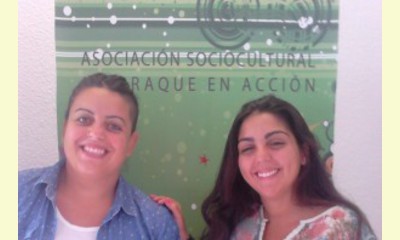|
|
Two youth from Aljaraque (Huelva, Spain) are participating in a solidarity project in Argentina
un article par Huelva Ya, el periodico digital de Huelva (abridged)
Two young members of the Sociocultural Association
in Action of Aljaraque are participating in the
volunteer project "WAVE2" in Argentina for seven
months, thanks to the program of European Youth in
Action and in collaboration with the Association
for Rural and Environmental Development of Targu
Jiu (Romania).

Amparo and Patricia
click on photo to enlarge
More and more young people are becoming aware
ofinjustice and unsustainability of modern life
and deciding to spend a period of their lives to
try to make the world better and more sustainable
for their personal development and education. The
European Voluntary Service is part of the Youth in
Action Programme of the European Commission.
"Through non-formal learning experiences, young
people improve or acquire, through voluntary work
in another country, competences for their
personal, educational and professional development
as well as their social integration".
Amparo Vidarte and Patricia Macias two members of
the Sociocultural Association in Action of
Aljaraque will benefit from this volunteer project
that will take place over a period of seven months
in the city of San Juan and Cordoba in Argentina.
They expect to work with youth and children at
risk of exclusion. They begin their intercultural
experience tomorrow by traveling to Argentina
where they expect to be welcomed by the Argentina
Youth Organization for the United Nations
(OAJNUT). Patricia Macias plans to work on their
volunteer project in San Juan, while Amparo
Vidarte will be at their headquarters in Cordoba.
The goal of the WAVE2 project is to contribute to
the creation of a culture of peace and respect for
human rights while promoting active participation
through volunteering.
The objectives are to:
1. encourage cooperative work between organizations
from around the world.
2. promote volunteerism and active participation by
young people.
3. integrate human rights and human rights education
worldwide through volunteer work.
4. promote a spirit of global citizenship and
friendship between young people around the world.
5. improve the life skills of young volunteers.
6. strengthen capacity and mutual support between
organizations working with youth.
7. contribute to the development of the
communities of the volunteers.
The European Voluntary Service funds the stay and
support of those involved in the program. . . . .
The European Voluntary Service activities can
develop in multiple areas: culture, youth, sports,
social care, cultural heritage, arts, civil
protection, environment, development cooperation,
etc.. "Their goal is to develop solidarity and
promote tolerance among young people" . . .
(Click here for a Spanish version of this article)
|








|
DISCUSSION
Question(s) liée(s) à cet article:
Is there a renewed movement of solidarity by the new generation?,
* * * * *
Commentaire le plus récent:
from Javier Collado Ruano, Director of Edition at Global Education Magazine, on the occasion of the International Day of Solidarity.
Solidarity is a trans-dimensional phenomenon that goes beyond the ontological essence of human nature. In fact, when we analyze the connections between the microcosm and the macrocosm, we perceive that human beings are not involved in chaos and arbitrariness, but belongs to the large network of interdependencies, complementarities and reciprocities that constitute life. The emergence of life on Earth, around 3,8 billion years ago, was a complex process of exceptional natural phenomena, inherent in all living systems. A process which is expressed through unlimited creativity: mutation, gene exchange, and symbiosis. From a cosmo-biological perspective, we can understand a new conceptual dimension of life, where all living beings share same basis of genetic code: the twenty amino-acids and four phosphatic bases. In fact, the diversity of living beings is caused by the combination of this cosmo-bio-genetic basis.
This trans-dimensional perspective has a deep ecological and spiritual sense for our worldview because the human evolutionary adventure is the latest stage of life on Earth. The modern human being is a vertebrate animal, mammal, belonging to the primates, which emerged 200,000 years ago. In recent centuries he has imposed its anthropocentric, industrial and capitalist vision to the detriment of Pachamama (and Indigenous goddess known as earth mother). We consume around 120% of the natural resources that Earth Mother regenerats annually. Our consumer behavior is immersed in a fatalistic dynamic with a destiny to climate change (deforestation, loss of biodiversity, ozone, etc.), and our own self-destruction as a species.
There is an urgent need to get beyond the cognitive fallacy that the mental structures of social Darwinism and capitalist postulates of the 19th century have historically constituted, because they only understand natural and social systems as warmongers and competitive processes whereby species diverge from each other. . ... continuation.

|
|









